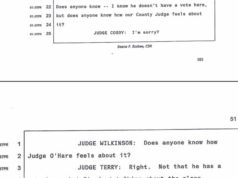The way Static sees it, the only madness about reefer is the extremes to which the federal government has traditionally gone to police its use among the approximately 100 million Americans who occasionally relax by puffing the ganja. But in these tough economic times, more states are looking at medical marijuana as a possible tax source.
About the money: The weed was used for centuries as a home remedy for ailments ranging from arthritis to glaucoma to chronic pain. But the influence of corporations and lobbyists spelled doom for this free and legal plant. The drug companies spread a lot of money around, laws got passed, and all of a sudden a plant that had been smoked for thousands of years was being compared to the most dangerous narcotics known to man. Pot was made illegal in 1937, and the federal government still lists marijuana as a Schedule I drug in the same category as heroin.
But 19 states, led by California, are considering relaxing their pot laws. One Texas Republican, U.S. Rep. Ron Paul, supports such reform. A growing number of Americans, as reflected in a recent Gallup poll, favor legalization. And President Obama has even yanked the chain on the federal Drug Enforcement Administration bullies who, under President George W. Bush, charged into states that allow medical marijuana, making arrests and reminding everybody that federal law trumps state laws. Maybe the madness is on the wane after all.
Save Your Space: Shrink the Junk
A new junk man is in town, ready to haul away all the crap that’s cluttering your space. Andrew Sander isn’t exactly Fred Sanford — he’s got a college degree and an environmental and charitable bent. The Texas Tech University graduate is the general manager of the new 1-800-Got-Junk? franchise in Tarrant County, and for a fee he’ll cart off all that stuff you can live without and put it somewhere other than the landfill if possible. “We go into homes and businesses and remove all the junk from people’s lives that they can’t get rid of,” he said. “We give people back their space.” (Despite hints from her staff, Static’s boss Gayle Reaves declined to hire Sanford to reduce the piles on her desk.)
As part of the service, he guarantees not to dump the stuff illegally, and he tries to find new homes and uses for everything he can. “We recycle or donate 60 percent of everything that comes in … to keep things out of the landfill as much as we can,” he said. Each call is different. Sander has already hauled off 20 refrigerators that were used to store breast milk for babies, cleaned out attics, and found new homes for various other things. But his most interesting find came about two weeks ago at a building that had been used as an illegal gambling site before being busted by the cops. “We found $2,500 in two-dollar bills,” he said. He offered to return the money to the building owner but was told to keep it — the owner was turning over a new leaf and didn’t want the dirty money, Sander said.











